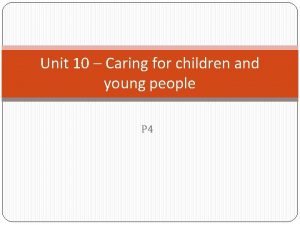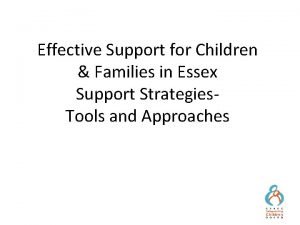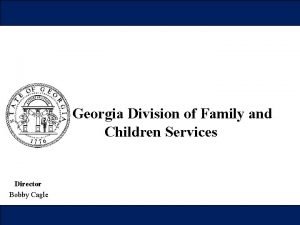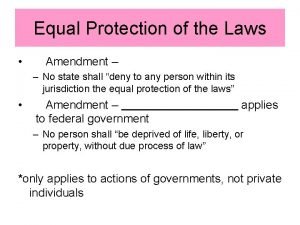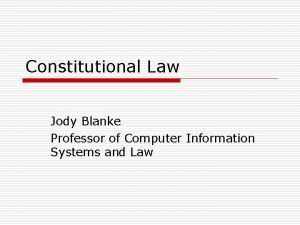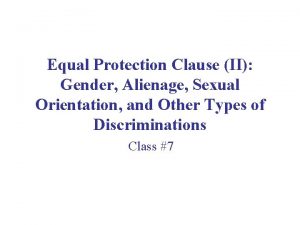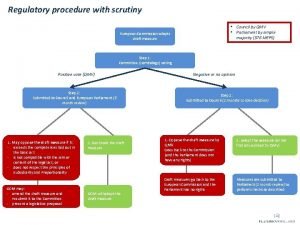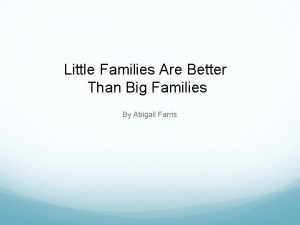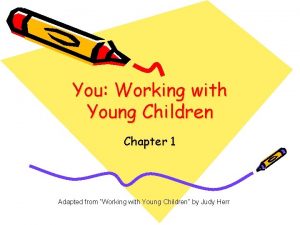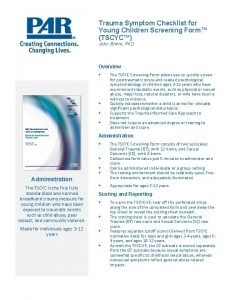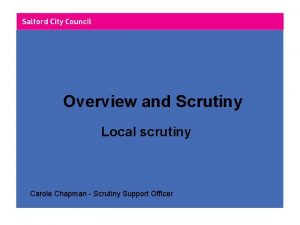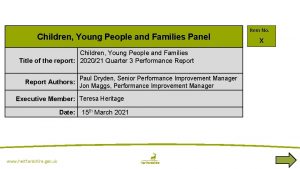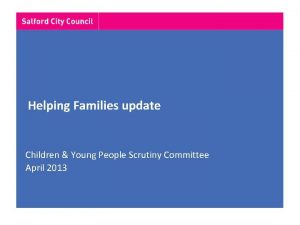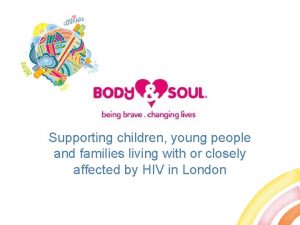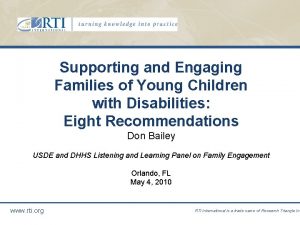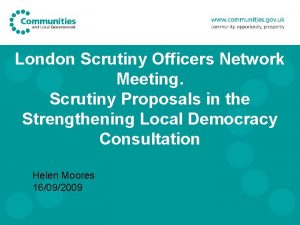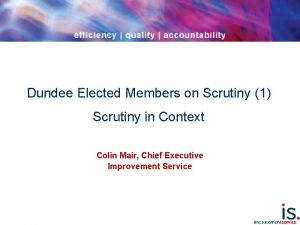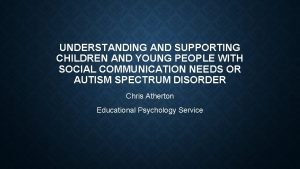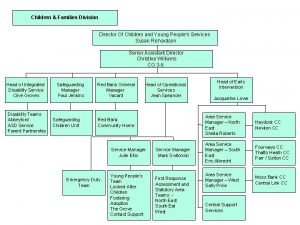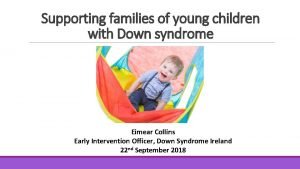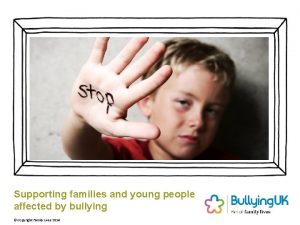Supporting Families Children Young People and Families Scrutiny
















- Slides: 16

Supporting Families Children, Young People and Families Scrutiny Wednesday, 13 June 2012

Defining the cohort: Youth Crime and ASB

Defining the cohort: Education

Defining the cohort: Youth Crime, ASB and Education

Defining the cohort: where Ward Youth Crime ASB Education Broughton 29 35 78 Claremont 8 3 18 Irwell Riverside 17 28 85 Kersal 13 7 35 Langworthy 24 63 63 Ordsall 15 20 56 Weaste & Seedley 20 13 46 Pendlebury 21 12 50 Swinton North 19 17 45 Swinton South 16 9 30 Barton 25 11 32 Cadishead 5 6 28 Eccles 16 1 21 Irlam 17 5 39 Winton 19 16 60 Boothstown & Ellenbrook 5 0 13 Little Hulton 47 28 57 Walkden North 25 15 28 Walkden South 4 1 22 Worsley 6 2 2 Locality CENTRAL Youth Crime ASB Education 126 169 381 NORTH 56 38 125 SOUTH 82 39 180 WEST 87 46 122 351 292 808 SALFORD Outside Salford 49 Address Unknown 58 Source: Salford City Council, Salix, City West, DWP, 2012

Delivery Planning

Team around the Family In order to deliver CLG outcomes we need a process that can support families to: 1. Tackle youth crime 2. Tackle family ASB 3. Improve school attendance 4. Support adults into work And 5. Deal with other issues that are a local priority

Team around the Family In order to design the process for managing Team around the Family, the Design & Delivery group is: • Working with Business Process Re-engineering to deliver a design workshop that will consider practice from current models, including: • CSRT, EIP, YOS. • Appraising a range of options for a family assessment tool, including: • Range of existing specialist assessments (e. g. CAF; ASSET; CAMHS; NAF etc. ) • New comprehensive family assessment (e. g. FIP Family Assessment; CAF+) • New family screening tool as a gateway to specialist assessments (e. g. BLCs Assessment)

• Large rent arrears • County Court Judgement • Benefits dependant • Family has poor diet • The children have a better relationship with their grandparents • Live in poorly maintained 3 bed Council house • Multiple calls to Council for repairs to property • Neighbour complaints about the condition of the house, noise, rubbish and vermin The Button family following a data trawl and assessment sightings at the property. • £ 12 per week reduction in Housing and Council Tax Benefits to recoup overpaid benefits after receiving a caution for not declaring previous partners living at the property • Workless • Drug dealer • In and out of prison • Regularly stops over and shares • Workless and on Out of Work Benefits – Income Support, Child Benefit, Child Tax Credit, full Housing Benefit and Council Tax Benefit. • Is on ABC for anti-social behaviour. Identified by RSL as meeting the ASB criteria. Identified via Housing Provider data. rooms with younger children • Regularly violates terms of his probation order and visits the property • Identified as workless via DWP who have provided a list of benefits. • Alcohol dependant • Suffers from anxiety and depression • Mistrusts public services and worries she might lose her children • Unaware of support available • Ignores the advice from her GP • Poor literacy • Often sleeps-in and unable to help the children get ready for school • Suspected victim of domestic violence by Jason and previous partner. • A conviction for shoplifting, identified by • Workless • Drug user • Not registered with a GP • Regularly stops over and shares rooms with younger children YOS. • Allows her boyfriend to stop over and use drugs in the home • Unemployed • No qualifications • Wanted to be a hairdresser but discouraged from working in case family loses benefits entitlement • Previous request for alternative accommodation turned down as low priority • Smoking large quantities of cannabis and becoming paranoid • Some evidence of early psychosis • Being referred to Adult Mental Health by GP • Regular truant from school – meets the DFE absence criteria & identified via sweep of EMS • Permanent case for his exclusion is due soon. • Frequently late for school • Often arrives at school inadequately clothed, hungry and dirty • Is working with an EWO. = • Has Attention Deficit Disorder • Constantly placed in (ADD) • Frequently late for school • Often arrives at school inadequately clothed, hungry and dirty • Bullied at school about his appearance front of television with little interaction from the rest of the family • Does not attend local Children’s Centre • Seen wandering around estate without appropriate shoes and clothing members of the family identified as meeting the TF selection criteria.

Process Review CSRT YOS Education Workless (EIP) Crime / ASB Workless Education Partial Individual Audit Trail Flexibility Potential Ind / Family Other Meets monthly. No consent required. Access limited to families with young children

Headlines • None of the existing processes currently meet the TF requirements – work with individuals not families. • Education / Worklessness share the same platform (EMS) but it doesn’t operate at family level. • Potential within EIP to deliver against all 3 TF criteria – Education / Crime & ASB / Worklessness

Outline Options • Option 1: Do Nothing • Option 2: Flex 1 or more current processes. • Option 3: Co-opt into one process • Option 4: Develop bespoke process

Performance Management In order to drive service improvement and secure payment by results from CLG, we need a process that will: • Certify the eligibility of families • Baseline families against a range of CLG and locally determined criteria • Track families and measure progress • Monitor and verify outcomes • Report to CLG with agreed format and frequency • Analyse impact and return on investment • Inform and support strategic commissioning decisions

Assessing Interventions: BIT works with families to support children who are at risk of permanent exclusion from school or family breakdown leading to the child going into care. Success rates are close to 90% of those who engage. BIT is an internationally evidenced programme of therapy based upon solution focused methodologies. Overall Fiscal CBA Actual costs Discounted costs Net Present Value (NPV) Financial Year 2011 2012 2013 2014 2015 Costs 114, 721 0 0 Benefits 593, 460 423, 900 254, 340 Costs 114, 721 0 0 114, 721 Benefits 593, 460 409, 063 236, 848 228, 558 220, 558 1, 688, 487 Overall Fiscal benefit cost ratio 14. 71817433 Payback peri od 1 years

Assessing Interventions: FGC Family Group Conferences : - • Support extended families to work through issues and define their own solutions. • Workers set out the parameters of the meeting, but the family creates an improvement plan. This is quality assured by the worker. • There is international evidence of the positive impact of FGC. • The service currently deals with about 70 cases per year. • Low cost intervention putting the family at the heart of the process

Discussion
 Unit 10 caring for children and young people
Unit 10 caring for children and young people Effective support for children and families in essex
Effective support for children and families in essex Georgia department of children and families
Georgia department of children and families Richard lovelace facts
Richard lovelace facts Fairvote
Fairvote Strict scrutiny test
Strict scrutiny test Strict scrutiny test
Strict scrutiny test Michael m v superior court of sonoma county
Michael m v superior court of sonoma county Regulatory procedure with scrutiny
Regulatory procedure with scrutiny Media scrutiny definition
Media scrutiny definition Big families vs small families
Big families vs small families Working with young children chapter 1
Working with young children chapter 1 Trauma symptom checklist for children™ screening form
Trauma symptom checklist for children™ screening form Prephonemic stage
Prephonemic stage Eyfs moodle hampshire
Eyfs moodle hampshire Alcohol consumption causes blood vessels to contract.
Alcohol consumption causes blood vessels to contract. The young and their world
The young and their world
